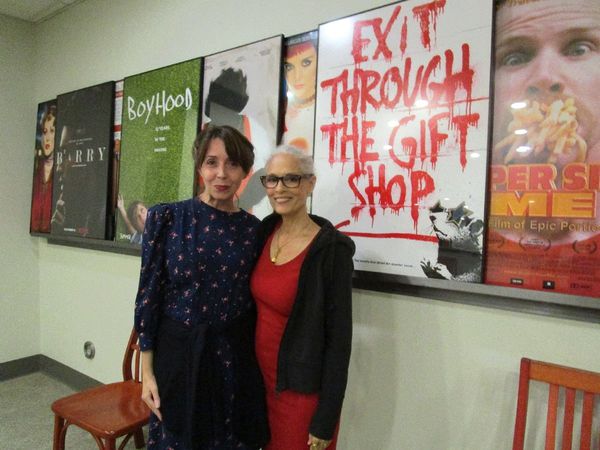 |
| Sônia Braga with Anne-Katrin Titze on her role in Bacurau: "She's a person that takes care of the community." Photo: Rachel Allen |
Kleber Mendonça Filho and Juliano Dornelles' Bacurau, shot by Pedro Sotero (Aquarius, Neighboring Sounds), had its world première at the Cannes Film Film Festival where it won the jury prize (shared with Ladj Ly's Les Misérables) and is a highlight of the New York Film Festival.
On the afternoon following the US première at Alice Tully Hall, the directors of Bacurau and Sônia Braga, (who stars alongside Udo Kier (Rick Alverson's The Mountain) and Barbara Colen) joined me for a conversation. The Paris Theatre in New York, where Bruno Barreto's Dona Flor And Her Two Husbands and Aquarius had their premières, has a special place in Sônia Braga's heart.
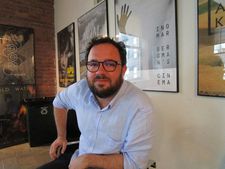 |
| Bacurau co-director Juliano Dornelles was the production designer on Kleber Mendonça Filho's Aquarius and Neighboring Sounds Photo: Anne-Katrin Titze |
In Vincente Minnelli's Brigadoon, two American hunters lose their way in the Scottish Highlands to discover the mystery of love. The hunters of Bacurau have a different agenda.
From outer space and through the stars we discover Earth and land on a little spot in the Northeast of Brazil, called Bacurau. It isn't found on any map and you might even think that it is a kind of Brigadoon, a village that regularly sinks into the sands of time. We are not in the past, but in the future, one so close that you can almost touch the splendid sunsets, while wondering about the many coffins being delivered.
A funeral takes place when we arrive, that of a matriarch, whose death plunges the doctor, Domingas (Sônia Braga) into a state of wailing. She mourns in her own way. Unusual incidents start to occur. A flying saucer drone is the least of it. Bullet holes in the water truck? Horses running wild on main street? Children's play isn't children's play anymore.
Two garishly dressed strangers on motorcycles are the first harbingers of things to come. A local politician runs for re-election and dumps a pile of books as if they were a gift of garbage on Bacurau.
When I met with Sônia, we discussed how much more than a movie Bacurau is for her and what she wishes for.
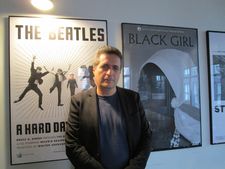 |
| Bacurau co-director Kleber Mendonça Filho in the spotlight Photo: Anne-Katrin Titze |
Anne-Katrin Titze: When we were talking about Aquarius, you unpacked your red carpet slippers that your mother made.
Sônia Braga: Oh, yeah. I don't have them today. This is more it [she lifts the leg to show me her footwear.]
AKT: Flip-flops, very fitting for this 90 degree October day.
SB: I was thinking about this yesterday, when I was doing Aquarius, it was like from 9 to 9 interviews. There was a rhythm. And for this one, this is my first interview. I mean in English, not in Portuguese; I've done some in Brazil. But it is not the same, which is nice as well.
Of course Kleber and Juliano, they are the authors, they made the movie, they are the directors, they have all the information. They are on the road, like nonstop, for so long. You're going to have something different.
AKT: I'll speak with them later.
SB: And then you'll say "What was Sônia talking about?"
AKT: Your role is interesting because it feels almost as if you are two different people. In the beginning of Bacurau, you are this woman who comes to the wake and is very angry. And we, spectators, think we know who this is. In many films she would be a stereotype, the madwoman.
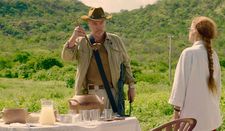 |
| Sônia Braga as Domingas with Udo Kier as Michael in Bacurau: "He leaves the people and I am there." |
SB: We cannot do spoilers!
AKT: No we won't. I'm not going to spoil anything. We can talk about the change in your character. That's not giving anything away. She's a doctor. There's so much more to this woman.
SB: Yes, that was something she's supposed to be. She's a person that takes care of the community. And she drinks. And when her friend dies - one of the things that I screamed was "It's not fair that a friend dies! A friend shouldn't die!" That's my sentiment about the death of her, that woman who was a leader. Not just because she was a friend, maybe she was an affair. You know, we cannot dictate what characters are. We feel and we make them. And my sentiment at that moment was: People shouldn't die. Why do they die? I wanted to overdo it; I wanted to be so crazy about this huge question of death.
You know my father died when he was 39. I was eight. My grandmother died when she was 60, older for the time. But I was 10. So right after. And she was my godmother. I dealt with death very young in my life. So I thought, within this community [of Bacurau] it was important to have a reaction of death not like that I did in Dona Flor And Her Two Husbands, to be crying over it. I mean, I didn't decide that, the directors wrote it that way.
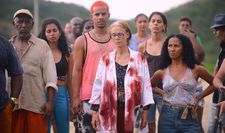 |
| Sônia Braga: "For me Domingas, she's a quiet person. She doesn't judge anybody." |
AKT: I have to insert a little bracket here: The Paris Theatre closed in New York.
SB: I know! I was so sad.
AKT: Bruno Barreto sent me his remembrance of the Paris and the beautiful photo of the opening night of Dona Flor is at the top.
SB: Yes, it was amazing. Aquarius opened there as well. The Paris closing, to me it's like - it's my theatre.
AKT: It's your theatre! But end of parenthesis and back to what you wanted to say about your role in Bacurau.
SB: For me Domingas, she's a quiet person. She doesn't judge anybody. There's something that happened while we were shooting. A councilwoman in Rio de Janeiro was brutally killed. And they still don't know who sent her to her death. She was very political, very active. Marielle Franco. Twenty days before her death, because of the horrible things that are happening right now, we had a meeting to talk about this. Rio actors, activists, leaders of parties and everything got together in a friend's apartment.
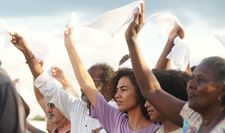 |
| Bárbara Colen as Teresa in Bacurau |
And she was one of the speakers. So 20 days before I went to the Northeast, I met her and I saw her speaking. She was talking about the reality of her community, how bad it is and the brutality. The last thing she said was to stay alive: "We've got to keep on living." The violence in Brazil was already starting way back when we were shooting the truck with the bullets.
AKT: The water truck?
SB: Yes, that was around the day, if it wasn't the day, there was a caravan for Lula [Luiz Inácio Lula da Silva, former president of Brazil] that he was doing for the election. And they shot at him, they shot at the caravan. So we were doing this movie.
AKT: And all these things were happening at the same time.
SB: Yes, all happening at the same time. For me, Domingas, she was a person who was almost going about her business. She was seeing people who were sick, she tells the woman the day after that she has a hangover. She's there but she doesn't do what other people do in the film. It's like almost she's looking to God, but she's not.
AKT: She's not a part of it?
SB: She is in a different way. Which I think is nice, to have a character who observes. She doesn't shoot anybody. Maybe because she's trying to save everybody, even the American that's shot. Later she says to Michael [Udo Kier] "I tried to save her."
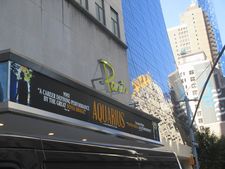 |
| Sônia Braga on the closing of The Paris Theatre where Aquarius and Dona Flor And Her Two Husbands had their premières: "I was so sad." Photo: Anne-Katrin Titze |
AKT: The scene with you and Udo Kier is great. I got the sense from both of you that these characters don't fully belong.
SB: He leaves the people and I am there. When I come back I have my girlfriend and we have a kiss and she's really upset with me that I did this big thing. You know, I've worked for 55 years, and this is the strangest sensation about a movie I've ever had.
AKT: In which way?
SB: In the way that I behave like I'm a spectator and not an actor in the film. My body remembers the place. As a person today, the place that is there, Barra [in the Sertao do Seridó]. Not a person playing Domingas, doing Domingas, being Domingas in there.
AKT: It's far closer to reality than your other roles?
SB: Yeah, my body remembers reality. My body there and their needs. The place where we shot, they didn't have the road.
AKT: The production built the road?
SB: They replaced a road every day almost for us to get back and forth. But the people that live there, the kids had to get a bus every day and go one hour to the school. They don't have an infirmary, they don't have a hospital, they have nothing. When I left, I wanted to make sure that they would never be forgotten. We still text to each other. So my reference to the place is in the real life. The sunsets. The dog! There's a dog that had puppies and they send the pictures of the puppies. Like every week I get a sunset, a different one.
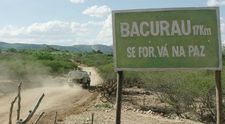 |
| Sônia Braga on the road in Bacurau: "The place where we shot, they didn't have the road." |
AKT: The sunsets are spectacular. I noticed them in the film; they are fantastic and always different.
SB: Like every day. I have pictures of every day a sunset. The film takes place in the future. And I was thinking lately, as Marielle was killed, about the core for Domingas. I cannot do that face, I cannot play that woman without that pain. There's no actor who can be in so much pain. I've been saying this since the Seventies, my hope for Brazil, for any country, is that the children can fulfil their destiny. That's all I want for the world, for the planet.
AKT: A climate that makes the world liveable. The name of this invented town is Bacurau. Which is a bird?
SB: Yes, the fictitious town.
AKT: And it's a fictitious bird also?
SB: No, the bird exists.
AKT: You saw in the paper last week, how we've lost three billion North American birds since the Seventies?
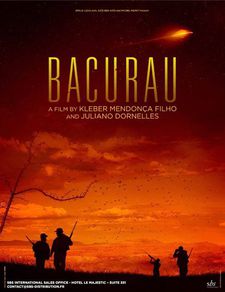 |
| Bacurau poster |
SB: Yes, billions of birds! And bees. It started already. When are they going to see it? There is one scene in the movie. To me the movie is about when the foreigners come to the little bar. There's a boy sitting there. And they say "People that are born in Bacurau, what are they?" And the kid says "People." To me, that is the movie. [Sonia also brings up another scene later, which would be a spoiler].
This boy has this consciousness [Sonia wrote down his name for me - Kauan] already. I'm a person. I have the same blood as you do. That's the character most attractive to me. He is a boy. And I hope he would have a future. In Brazil, a month ago, a girl eight years old, she's in a van, in a car, and a stray bullet found her and killed her. Again, a kid, a family shouldn't go through this. She could have been a scientist that would solve problems in life.
AKT: There is a sense of the future in the film that is not at all science fiction and very frightening and real. As it says in the end "This is only the beginning."
SB: There is one scene, where somebody passes by and there's a television in the back. And they say "Executions today." In a road in Sao Paulo. It's very subtle. And to me that is like wow. How many years from now? Are we there?
AKT: I think we are at a moment we never thought we'd be at. Just ten years ago, would you have thought the world could look this way?
SB: I don't think things are changing. I think we were trying not to see what was there.
AKT: So much more of people's aggression and hatred are being expressed now. I agree with you that people might have had these thoughts but were more reluctant to express them. There used to be a kind of barrier that seems to have dropped.
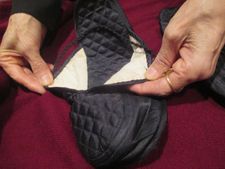 |
| Sônia Braga's Aquarius red carpet relief slippers that her mother made Photo: Anne-Katrin Titze |
SB: Did you see the documentary The Great Hack on Netflix?
AKT: No.
SB: It's about who is behind this and where that started. It's so strange to see the truth behind all the depositions of Facebook, denying no we didn't know it. How now the hackers are doing testimonies and everything. It's interesting because we start to understand better that the people who were saying terrible things to you, they were not even people. We are in the weird future.
AKT: We are. That is the perfect ending.
Bacurau screens at the London Film Festival tonight, October 4.
Coming up - Kleber Mendonça Filho and Juliano Dornelles on Bacurau.





















